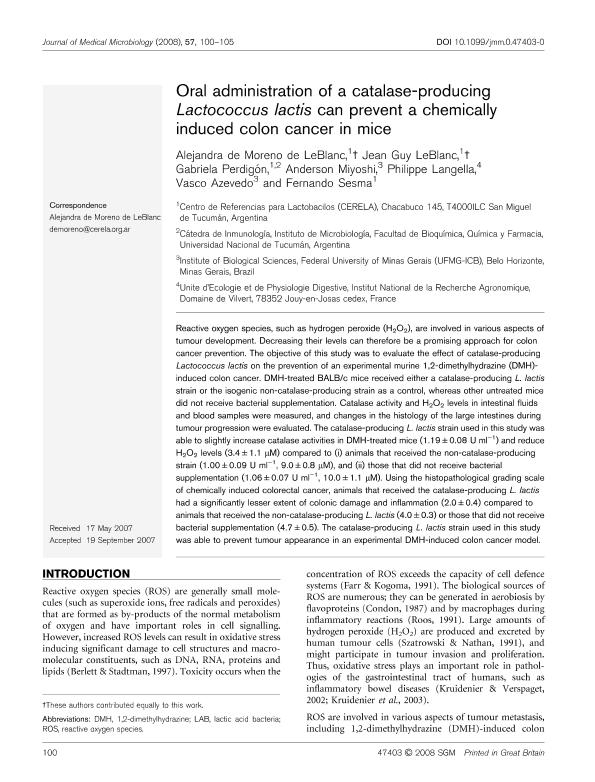Artículo
Oral administration of a catalase-producing Lactococcus lactis can prevent a chemically induced colon cancer in mice
de Moreno, Maria Alejandra ; Leblanc, Jean Guy Joseph
; Leblanc, Jean Guy Joseph ; Perdigon, Gabriela del Valle
; Perdigon, Gabriela del Valle ; Miyoshi, Anderson; Langella, Philippe; Azevedo, Vaso; Sesma, Fernando Juan Manuel
; Miyoshi, Anderson; Langella, Philippe; Azevedo, Vaso; Sesma, Fernando Juan Manuel
 ; Leblanc, Jean Guy Joseph
; Leblanc, Jean Guy Joseph ; Perdigon, Gabriela del Valle
; Perdigon, Gabriela del Valle ; Miyoshi, Anderson; Langella, Philippe; Azevedo, Vaso; Sesma, Fernando Juan Manuel
; Miyoshi, Anderson; Langella, Philippe; Azevedo, Vaso; Sesma, Fernando Juan Manuel
Fecha de publicación:
01/2008
Editorial:
Society for General Microbiology
Revista:
Journal Of Medical Microbiology
ISSN:
0022-2615
e-ISSN:
1473-5644
Idioma:
Inglés
Tipo de recurso:
Artículo publicado
Clasificación temática:
Resumen
Reactive oxygen species, such as hydrogen peroxide (H2O 2), are involved in various aspects of tumour development. Decreasing their levels can therefore be a promising approach for colon cancer prevention. The objective of this study was to evaluate the effect of catalase-producing Lactococcus lactis on the prevention of an experimental murine 1,2-dimethylhydrazine (DMH)-induced colon cancer. DMH-treated BALB/c mice received either a catalase-producing L. lactis strain or the isogenic non-catalase-producing strain as a control, whereas other untreated mice did not receive bacterial supplementation. Catalase activity and H2O 2 levels in intestinal fluids and blood samples were measured, and changes in the histology of the large intestines during tumour progression were evaluated. The catalase-producing L. lactis strain used in this study was able to slightly increase catalase activities in DMH-treated mice (1.19 ± 0.08 U ml-1) and reduce H2O2 levels (3.4 ± 1.1 μM) compared to (i) animals that received the non-catalase-producing strain (1.00 ± 0.09 U ml-1, 9.0 ± 0.8 μM), and (ii) those that did not receive bacterial supplementation (1.06 ± 0.07 U ml-1, 10.0 ± 1.1 μM). Using the histopathological grading scale of chemically induced colorectal cancer, animals that received the catalase-producing L. lactis had a significantly lesser extent of colonic damage and inflammation (2.0 ± 0.4) compared to animals that received the non-catalase-producing L. lactis (4.0 ± 0.3) or those that did not receive bacterial supplementation (4.7 ± 0.5). The catalase-producing L. lactis strain used in this study was able to prevent tumour appearance in an experimental DMH-induced colon cancer model.
Palabras clave:
Catalase
,
Lactic Acid Bacteria
,
Colon Cancer
Archivos asociados
Licencia
Identificadores
Colecciones
Articulos(CERELA)
Articulos de CENTRO DE REFERENCIA PARA LACTOBACILOS (I)
Articulos de CENTRO DE REFERENCIA PARA LACTOBACILOS (I)
Citación
de Moreno, Maria Alejandra; Leblanc, Jean Guy Joseph; Perdigon, Gabriela del Valle; Miyoshi, Anderson; Langella, Philippe; et al.; Oral administration of a catalase-producing Lactococcus lactis can prevent a chemically induced colon cancer in mice; Society for General Microbiology; Journal Of Medical Microbiology; 57; 1; 1-2008; 100-105
Compartir
Altmétricas



